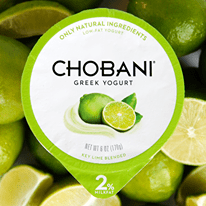Advertising Age
By E.J. Schultz
 The non-GMO movement is making Chobani its latest target as activists begin to pressure dairy brands that had until now largely escaped scrutiny.
The non-GMO movement is making Chobani its latest target as activists begin to pressure dairy brands that had until now largely escaped scrutiny.
An organization called GMO Inside is calling on the Greek yogurt maker to stop marketing its products as “real” and “natural” until it stops using milk from cows that are fed with genetically modified feed. “Chobani has an opportunity to be a leader amongst meat and dairy companies by listening to its customers and ensuring its cows are given non-GMO food,” Elizabeth O’Connell, campaign director for GMO Inside, said in a statement on Tuesday.
The national organization, led by environmental group Green America, is urging consumers to sign a petition and log comments on Chobani’s Facebook page.
Chobani responded in a statement that “GMO is complex and weighs on the balance of our commitments, particularly affordability, as non-GMO ingredients are fewer and more costly. We are in the infancy of exploring how we as a company, together with our suppliers, will navigate this important issue. We have never made claims that our products are GMO-free.”
An estimated 70% to 80% of packaged foods contain genetically modified ingredients, including corn, soybeans and sugar beets. Proponents of GMO labeling say that genetically engineered foods have not been proven safe and that consumers should have a right to know what is in their food. Opponents counter that such claims are not scientifically justified and would raise food costs.
Up until now, most of the pressure has been on packaged foods like cereal and snacks, rather than byproducts of animals fed GMO ingredients. For instance, a GMO labeling ballot measure that state of Washington voters will consider in November exempts meat and dairy derived from animals that eat genetically engineered feed. The “yes” campaign notes that the exemption was “modeled on the most common global GE labeling standards.”
Asked why GMO Inside has begun making dairy an issue, Ms. O’Connell said: “So much of the GMO crops are going to animal feeds, so if we could change the way this is happening it could help to convert a lot of cropland back to non-GMO production.”
The last major test of consumer sentiment on the GMO issue came in November of last year when California voters rejected a proposal to label genetically modified foods (See related article, above). Since then, however, consumer concerns about GMOs have escalated and labeling proposals are percolating in multiple states, Wall Street analyst group Bernstein Research stated in a recent report.
Indeed, Bernstein said that “recent weakness in the cereal category is at least partly linked to rising consumer concerns” about the issue. Bernstein added that the “categories that are heavily consumed by children where they key decision maker is a parent … seem to be the most in trouble. More indulgent categories seem to be less affected.”

